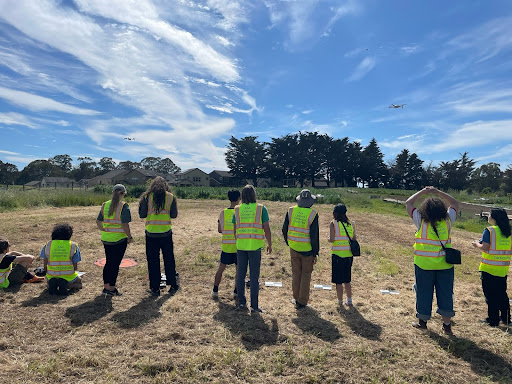Campus News
CIDER drone pilot program has trained 32 new commercial remote pilots in 2024 — application to join next year’s cohort opens in the fall
In 2024, the student cohort doubled from 20 to 40 students, and an agriculture-focused track was added alongside the general drone use track. CIDER invites all undergraduate students, regardless of their major, to learn more about the program and apply for next year’s cohort in the fall 2024.

This is the third year the CITRIS Initiative for Drone Education and Research (CIDER) has been training new commercial drone pilots in its extracurricular Drone Pilot Training Program. The focus of the program is to train students to use drones in their own research, to support faculty research and to gain valuable career skills. In 2024, the student cohort doubled from 20 to 40 students, and an agriculture-focused track was added alongside the general drone use track. CIDER invites all undergraduate students, regardless of their major, to learn more about the program and apply for next year’s cohort in the fall 2024.
The 2024 program started on January 8, and the first eight weeks focused on preparing students to take the FAA Part 107 Commercial Remote Pilot License exam, with two flight days included to teach basic flight skills to students. To this day, almost all students have taken and passed the exam and become commercial drone pilots, allowing them to use drones for work and research.
In the Spring quarter, students have worked in small groups to complete projects on the UCSC campus. The student teams have been gathering drone data to inspect solar panels at the East Remote Parking Lot, assess the effectiveness and sustainability of the sprinkler system at the athletic turf, inspect the Hahn to McHenry Bridge and the CASFS farm yurts, and assess health and yield of strawberries at CASFS farm. Each team will do mapping and photogrammetry, a 3D scan, and videography using drones, process the data with software commonly used in the industry, and present their findings and products during the final class. The final class will also include a career panel, providing students with information on career paths and opportunities in the drone industry, as well as a chance to meet drone industry professionals and get feedback from them on their project deliverables.
CIDER encourages all interested students to familiarize themselves with the Drone Pilot Training Program and the application process, which opens in the fall 2024. CIDER will organize a Drone Demo event in September 2024 in the Engineering Courtyard to meet students interested in applying for next year’s cohort and allow them to ask questions from the team.
UCSC CIDER was founded in 2021, and the first Drone Pilot Training Program cohort started in 2022. The program has changed its form slightly every year as the CIDER team has modified it to be more engaging and hands-on. The core idea of CIDER and the Drone Pilot Training Program is to increase and support DEI in the drone industry, along with training responsible drone pilots who are aware of safety, privacy, and security when flying drones.
In addition to running the Drone Pilot Training Program, CIDER works with other educational organizations in the community, including Hartnell College, Digital Nest, and Rancho Cielo, to train their instructors and support their drone program curriculum development. CIDER contracts with federal, state, and local agencies and industry, such as the California State Parks, completing drone surveys for their needs. CIDER also works with the industry and community to develop the workforce based on current and near-future demand. Please visit the CIDER website to learn more about our work in drone education and research.
CIDER is one of the programs run by the Center for Information Technology Research in the Interest of Society and the Banatao Institute or CITRIS for short – a multi-campus initiative focused on research and emerging technologies. Established in 2001, CITRIS leverages the interdisciplinary research strengths of UC Santa Cruz, Berkeley, Davis and Merced to advance the University of California’s mission. The institute was created to shorten the pipeline between world-class laboratory research and the development of impact applications, platforms, companies, and new industries, with an emphasis on creating solutions to large societal challenges. For more information visit the CITRIS website.